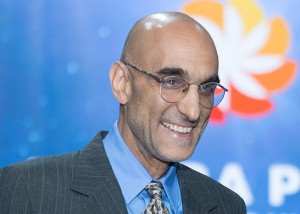 Dr. Tom Caneta has spent the last nine years sequestered in the Nuba Mountains of the African nation of Sudan. Around the clock, he heals the sick, bandages the broken, and takes cover from bombs dropping overhead. Caneta is the last doctor left in this civil war-torn region marked by starvation, disease, and death. He treats up to 500 patients per day.
Dr. Tom Caneta has spent the last nine years sequestered in the Nuba Mountains of the African nation of Sudan. Around the clock, he heals the sick, bandages the broken, and takes cover from bombs dropping overhead. Caneta is the last doctor left in this civil war-torn region marked by starvation, disease, and death. He treats up to 500 patients per day.
In June, Caneta was named winner of the Aurora humanitarian prize – $100,000 to Caneta and $1 million split between three charities of his choosing. Accepting the award, Catena said: “When the bombs are raining down, I think that any job must be better than this – even being an accountant. But when one little kid unexpectedly pulls through – it’s all worth it.”
The war-zone Mother of Mercy hospital is a long way from his previous life. Originally from Amsterdam, New York, Catena played football at Brown University and earned his medical degree from Duke University through a Navy scholarship. Catena visited Kenya while in medical school and returned as a medical missionary following his residency in Indiana.
“My decision to stay here was a simple one,” Catena told Catholic News Service (CNS). “As the only doctor at the only major hospital in the Nuba Mountains, I could not leave in good conscience. Also, as a lay missionary, I felt it was important to show the presence of the church in this time of need – to show that the church does not abandon her people when a crisis arises.”
In 2015, Catena was featured in Nickolas Kristoff’s New York Times column profiling his heroism and reporting that the doctor missed pretzels and ice cream, but mostly his family. The Kristoff column also noted that Catena wears a bracelet that says “John 3:30.” It is his focus each day: “He must become greater; I must become less.”
“I’ve been given benefits from the day I was born,” Catena told Kristoff. “A loving family. A great education. So I see it as an obligation, as a Christian and as a human being, to help.”
In response, Dr. Tom works daily to “pry out shrapnel from women’s flesh and amputate limbs of children, even as he also delivers babies and removes appendixes,” reported Kristoff. “He does all this off the electrical grid, without running water, a telephone or so much as an X-ray machine — while under constant threat of bombing.”
There is a local intensity of the love for Dr. Tom. “People in the Nuba Mountains will never forget his name,” said Lt. Col. Aburass Albino Kuku of the rebel military force. “People are praying that he never dies.”
A Muslim chief named Hussein Nalukuri Cuppi offered highest praise: “He’s Jesus Christ.” Kristoff wrote, “The chief explained that Jesus healed the sick, made the blind see and helped the lame walk — and that is what Dr. Tom does every day.”
“There also are many, many secular aid workers doing heroic work,” Kristoff continues. “But the people I’ve encountered over the years in the most impossible places — like Nuba, where anyone reasonable has fled — are disproportionately unreasonable because of their faith.”
Catena summarized his life’s challenge in a speech addressing the 2015 graduating class at Brown University: “Everyone is in search of happiness. Everybody is in search of fulfillment. I think if you really want fulfillment in this life, what I would suggest to you is go and get rid of everything you have. Sell everything you have. Get rid of all of your baggage and go live a life of full and total service to other people. I think if you do that, you will find that the rewards are incredible. You will find that you have fulfillment more than you could ever have imagined. So I throw that challenge out to you.”
To help Dr. Catena, go to www.amhf.us.